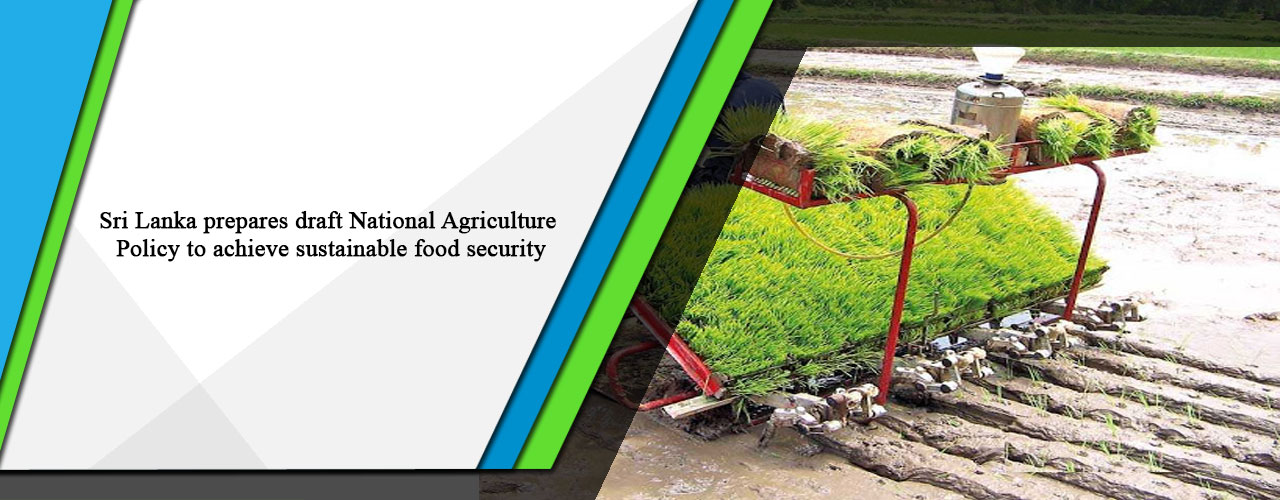Sri Lanka prepares draft National Agriculture Policy to achieve sustainable food security
The government of Sri Lanka has reportedly unveiled the draft National Agriculture Policy aimed at achieving the vision of “sustainable food security to achieve national prosperity.” Authorities are now seeking observations and comments from stakeholders and the public, according to local media reports.
The policy is primarily focused on food and feed crops, and sustainable food security with improved food quality, the Daily FT has reported.
According to reports, key issues addressed via the policy are crop production and productivity improvement, true self-sufficiency in basic food needs (food independence), planned resource use, market competitiveness, climate resilience, the minimisation of all risks and uncertainties, and the mainstreaming of gender and youth in the agriculture sector.
An expert committee representing the Ministry of Agriculture, Department of Agriculture, and the Department of Agrarian Development, as well as universities, the private sector and the farming community has also been appointed.
The Ministry is now seeking stakeholder and public feedback on the draft policy by 25 April.
The draft policy’s mission is to create a “socially-acceptable and sustainable food system in Sri Lanka through a globally competitive agricultural production, processing and marketing mechanism”.
Although the agriculture sector (primary production) accounts for about 7% of Sri Lanka’s Gross Domestic Product (GDP), 21.7% of its total exports, 25.5% of the national labour and nearly one-third of the total land area in the current context, the Ministry has stated that its indisputable contribution to shaping up the socio-economy and the environment of the nation is yet hard to place a value on.
In 2020, the overall agriculture sector accounted for 8.4% of GDP and reported a negative growth rate of 2.4% as against 1% growth in 2019 and 6.5% growth in 2018, the report has further noted.
The contraction in agriculture activities in 2020 according to the Department of Census and Statistics was mainly driven by ‘Marine Fishing’ (21.7%), ‘Growing of Oleaginous fruits, including coconut’ (10.2%), ‘Forestry and Logging’ (8.1%), ‘Growing of Tea’ (7.1%) and ‘Animal Production’ (4.9%).
However, during 2020, ‘Growing of Cereals’ (41.3%), ‘Fresh Water Fishing’ (12.7%), ‘Growing of Vegetables’ (10.1%), ‘Growing of Fruits’ (6.2%), ‘Growing of Rice’ (5.7%), ‘Growing of Rubber’ (4.6%) and ‘Growing of Spices’ (3.3%) expanded further.
The new draft agriculture national policy has set multiple goals to be achieved by 2030.
According to the news report, it aims to double resource productivity (compared to 2020 estimates) by adhering to sustainable agriculture practices, as well as the economic profitability of farmers/agri-producers (compared to estimates of 2020).
Other goals include: supplying safe and quality food in compliance with food control regulations of the country; establishing a government-regulated food control system supporting certification, standardisation, and other logistics; and the establishment of farmer/agri-producer groups with agri-entrepreneurship capacity, coupled with efficient market systems.
The draft policy also aims to establish a constituted role and the mandatory participation of farmers/agri-producers in the process of decision-making in the development of agri-food systems, while also making sure that the impacts of climate change and other disasters are minimised on the agri-food system in Sri Lanka. A system of transparency, accountability, and responsible and participatory governance will also be established with regard to decision making in relation to agri-food systems.
The draft policy has 10 thematic areas and 15 policy statements.
The thematic areas are Crop Production and Productivity, Input Management, Advanced Technologies, Food Safety and Quality Management, Eco-friendly Operations, Agri-Entrepreneurship and Markets, Producer Empowerment, Climate resilience and other risk management, Knowledge Management and Agricultural Extension, and Governance and Operations Management.
OSL take:
Sri Lanka’s agriculture sector is a constantly evolving sector that explores the latest trends and technologies in the global agriculture sector. This has opened up many business/investment opportunities in Sri Lanka’s agriculture sector. Foreign businesses/investors could therefore explore opportunities in Sri Lanka’s agriculture industry.
| Article Code : | VBS/AT/20210407/Z_4 |

